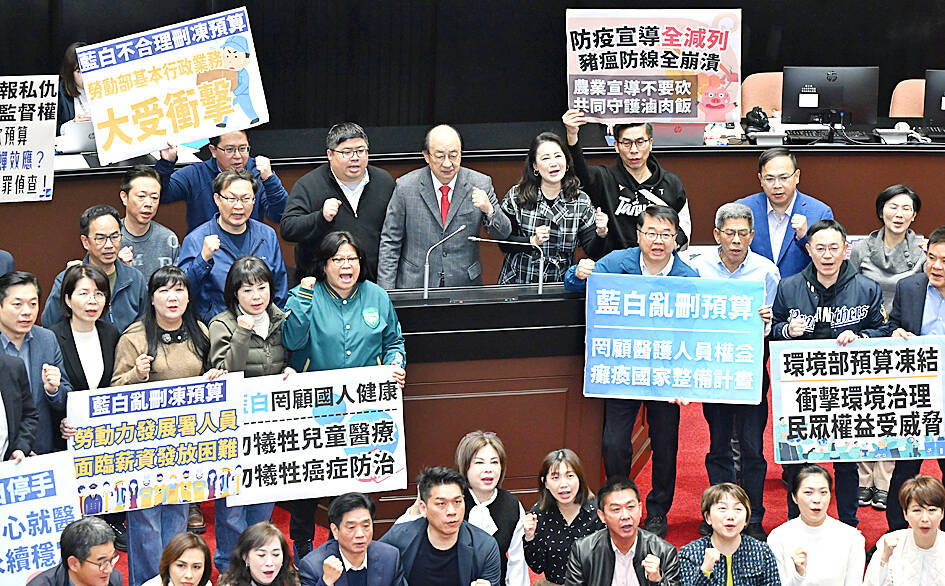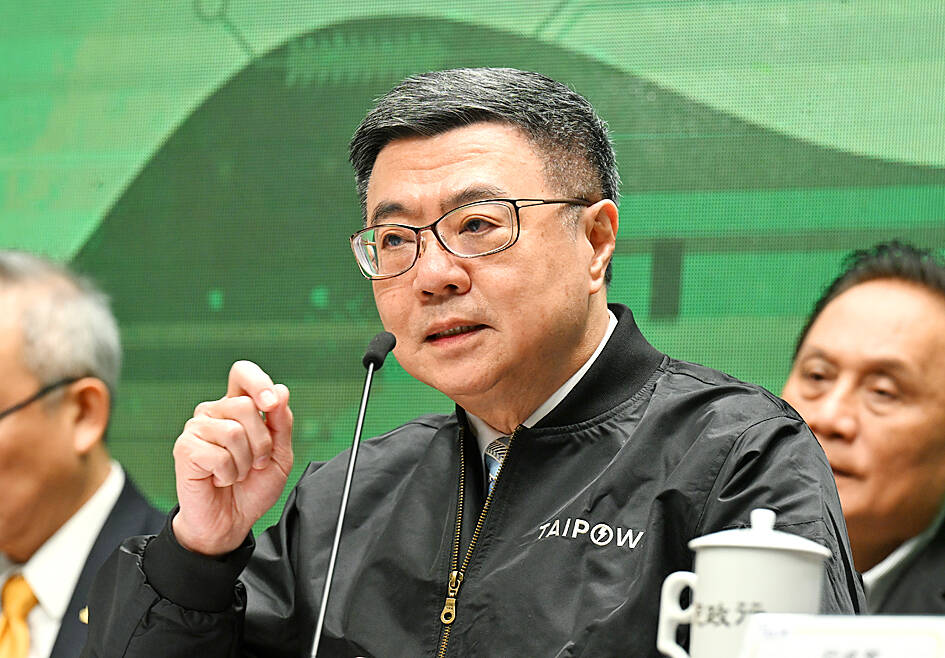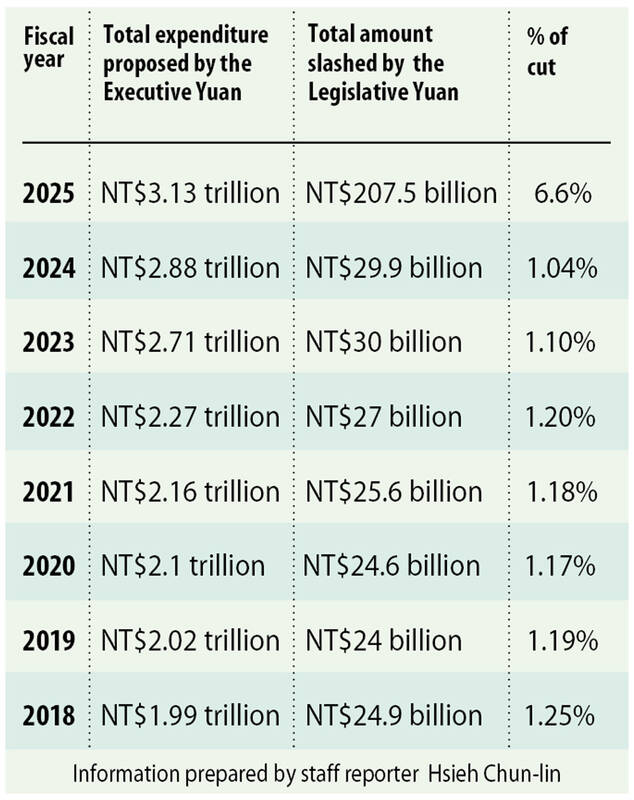The Legislative Yuan yesterday on third reading passed the central government budget for this year, cutting 6.6 percent from the Executive Yuan’s proposed expenditure — the largest in history.
The budget proposal, which the Cabinet approved in August last year, set government spending at NT$3.1325 trillion (US$95.6 billion), with projected revenues of NT$3.1534 trillion — both record highs — working out to a surplus of NT$20.9 billion.
On Friday last week, the opposition-led legislature voted to cut NT$93.98 billion from the budget’s general provisions.

Photo: Liao Chen-huei, Taipei Times
During a 20-hour continuous session from Monday until yesterday morning, they continued to slash the budgets of government agencies, bringing the total budget cuts to about NT$207.5 billion.
Cuts from general provisions include a 10 percent reduction in water and electricity fees, and 60 percent on special expenditures.
Special expenses for the Executive Yuan, the Mainland Affairs Council, the Council of Indigenous Peoples, the National Communications Commission, the Control Yuan, and the ministries of the interior, agriculture, digital affairs, justice, civil service and labor were completely eliminated.

Photo: Liao Chen-huei, Taipei Times
There would also be a 3 percent cut on military equipment and facilities.
Media policy and promotion expenses would be uniformly cut by 60 percent, unless otherwise specified.
More controversial proposals include a 70 percent freeze on the Executive Yuan’s operating expenses, a 50 percent cut and 30 percent freeze on the Control Yuan’s operating expenses, a 50 percent freeze on the Ministry of National Defense’s submarine budget and a 50 percent freeze on the Ministry of Foreign Affairs’ (MOFA) operating expenses.

Photo: Lin Cheng-kun, Taipei Times
While the opposition defended the reductions, saying they were seeking to stop wasteful spending, Premier Cho Jung-tai (卓榮泰) at press conference yesterday accused the opposition parties of “indiscriminately cutting budget items” in an attempt to disrupt the political operations of the Executive Yuan.
The proposed central government budget includes new items such as NT$79.8 billion for public construction, NT$41.5 billion for national defense expenditure, NT$36.6 billion for a National Health Insurance financial assistance program, NT$6 billion to improve the medical industry, NT$4 billion for a national cancer prevention program, NT$20 billion for public housing, NT$13.6 billion for national pension, NT$12.6 billion for National Science and Technology Council research projects, NT$5.3 billion for local teaching facilities and NT$4.9 billion for childcare services for children aged two to six, Cho said.
There is also an additional NT$2.2 billion for salary increases for public servants and military personnel that needs to be allocated, he added.

It is uncertain when the more than NT$260 billion frozen funds would be unlocked, which would delay many national projects and policies that are scheduled to start at the beginning of the year, Cho said.
Freezing 50 percent of the defense ministry’s submarine budget would undermine international confidence in Taiwan’s resolve to defend itself, he said.
Freezing 50 percent of MOFA’s operational budget would halt half of its activities at a time when Taiwanese diplomacy must remain strong to combat Chinese pressure, he said.
Separately, Bureau of Consular Affairs Deputy Director-General Chen Shang-yu (陳尚友) said the legislature’s 10 percent cut of administrative fees across all agencies — including about NT$120 million for the bureau — might affect passport issuance from October.
The bureau estimates that 2.05 million to 2.09 million new passports would be issued this year, but after the budget cut, the remaining funds would only be enough to issue about 1.85 million passports, so there might be difficulty issuing new ones from October, he said.
He also reminded the public to check their passport validity date if they plan to travel during the Lunar New Year holiday as consular offices would be closed from Saturday to Feb. 2.
People who need to renew their passport must apply before tomorrow to receive it on Friday.
Additional reporting by Chen Yu-fu, Lee I-chia and AFP

CHAOS: Iranians took to the streets playing celebratory music after reports of Khamenei’s death on Saturday, while mourners also gathered in Tehran yesterday Iranian Supreme Leader Ayatollah Ali Khamenei was killed in a major attack on Iran launched by Israel and the US, throwing the future of the Islamic republic into doubt and raising the risk of regional instability. Iranian state television and the state-run IRNA news agency announced the 86-year-old’s death early yesterday. US President Donald Trump said it gave Iranians their “greatest chance” to “take back” their country. The announcements came after a joint US and Israeli aerial bombardment that targeted Iranian military and governmental sites. Trump said the “heavy and pinpoint bombing” would continue through the week or as long

TRUST: The KMT said it respected the US’ timing and considerations, and hoped it would continue to honor its commitments to helping Taiwan bolster its defenses and deterrence US President Donald Trump is delaying a multibillion-dollar arms sale to Taiwan to ensure his visit to Beijing is successful, a New York Times report said. The weapons sales package has stalled in the US Department of State, the report said, citing US officials it did not identify. The White House has told agencies not to push forward ahead of Trump’s meeting with Chinese President Xi Jinping (習近平), it said. The two last month held a phone call to discuss trade and geopolitical flashpoints ahead of the summit. Xi raised the Taiwan issue and urged the US to handle arms sales to

A magnitude 5.6 earthquake struck off the coast of Yilan County at 12:37pm today, with clear shaking felt across much of northern Taiwan. There were no immediate reports of damage. The epicenter of the quake was 16.9km east-southeast of Yilan County Hall offshore at a depth of 66.8km, Central Weather Administration (CWA) data showed. The maximum intensity registered at a 4 in Yilan County’s Nanao Township (南澳) on Taiwan’s seven-tier scale. Other parts of Yilan, as well as certain areas of Hualien County, Taipei, New Taipei City, Taoyuan, Hsinchu County, Taichung and Miaoli County, recorded intensities of 3. Residents of Yilan County and Taipei received

Taiwan has secured another breakthrough in fruit exports, with jujubes, dragon fruit and lychees approved for shipment to the EU, the Ministry of Agriculture said yesterday. The Animal and Plant Health Inspection Agency on Thursday received formal notification of the approval from the EU, the ministry said, adding that the decision was expected to expand Taiwanese fruit producers’ access to high-end European markets. Taiwan exported 126 tonnes of lychees last year, valued at US$1.48 million, with Japan accounting for 102 tonnes. Other export destinations included New Zealand, Hong Kong, the US and Australia, ministry data showed. Jujube exports totaled 103 tonnes, valued at